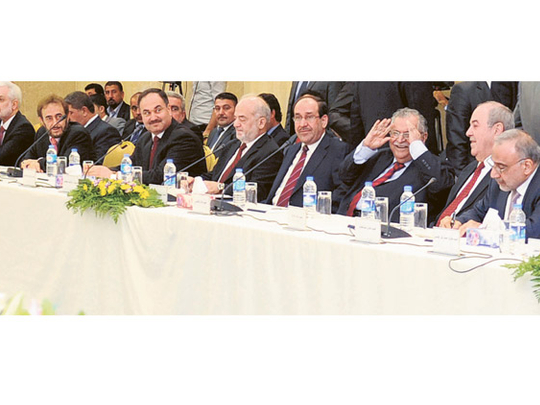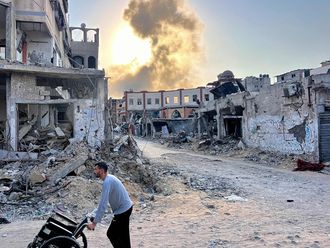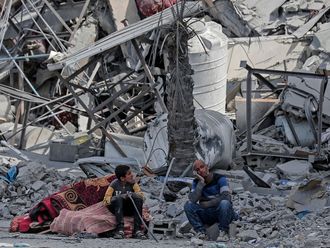
There have been grave headlines about the situation in Iraq appearing lately. And this highlights the instability in the country.
April was the bloodiest month for US forces in Iraq since November 2008. The US is keen on keeping some of its forces in Iraq beyond the December 2011 time limit set by the Status of Forces Agreement (Sofa) between Baghdad and Washington.
The Sadrists are threatening to re-activate the Mahdi Army and fight US troops if they do not pull out of the country as per Sofa. Besides, US sources say that there will be 20,000 employees in their embassy in Baghdad.
Another disturbing piece of news is related to 86 Iraqis killed by silenced weapons in two weeks, and Ebrahim Al Jaafari, former Iraqi prime minister, intervening to resolve the new disagreement between Prime Minister Nouri Al Maliki and House Speaker Osama Al Nujaifi.
Demonstrators are still calling for change each and every Friday, and the Kurdish parties are facing Kurds’ discontent with the ongoing oppression, while the issue of the vacant security ministries is still pending. Finally, Iraq has failed to host the Arab summit.
These are some of the main themes in the current political process. This shows the degree to which Iraqi society has become fragmented and the governing elite’s detachment from the suffering of the Iraqi people.
On less important levels, it is not difficult to see similarities in every governorate, but I do not want to go into details that cannot be contained in one article. The big players in this complicated scene are a few individuals. But a new, unwelcome player, has entered the fray. The new player, which is the Iraqi street, may be the most dangerous of them all, and has been neglected by politicians since the day after the elections on March 7, 2010.
The big players are aware that the current status quo cannot continue indefinitely. The government is unable to confront the real problems and dangers facing Iraq, both domestic and foreign.
It is a government that is on the verge of collapse, and the first person aware of this fact is Al Maliki. Since day one, he has not made any secret of his doubts regarding the government’s abilities. And despite all the efforts to hide them, the contradictions inside the Iraqi National Alliance headed by Al Maliki are more profound than before.
No guarantees
What is to be expected in the light of these complexities? And what are the possible options for Iraq’s political process and its major players?
The prime minister was keen to be the first to launch an initiative. He announced a 100-day time limit which ends on June 7 to evaluate ministers’ performance. Depending on that, ministers will either continue in their posts or will be asked to leave.
This is a pre-emptive measure which will serve many ends. It reflects Al Maliki’s willingness to offer more than one scapegoat to soften the popular outrage displayed during demonstrations in a number of Iraqi cities on the one hand, while expanding his space to manoeuvre on the other.
After the upcoming June 7 ultimatum, we will witness a new phase of conflict between Iraqi political elites, where its main constant will stem from the prime minister’s insistence on remaining in office. The clash will be based on the constitution and through its mechanisms. However, there will be many blows beneath the belt.
It is difficult at this time to talk about the balances that will emerge, as they have started changing. There will be no guarantee for the continuation of any bloc as a cohesive entity.
The options available to the prime minister include going to the parliament for the resignation of some or all the ministers — that is if he manages to retain his own post — and finding enough votes in the house to help him put together a parliamentary majority.
If that is not possible, he will start moves to dissolve parliament, if he is serious about his threats for, according to the Constitution’s item 64, “the parliament may be dissolved according to the request of one third of its members, or upon the request of the prime minister and the approval of the president”.
Regardless of who will benefit most from the dismantling of the government, a return to the no-government scenario is possible, because dissolving parliament and conducting early elections is not an option for most of the major players, and especially the prime minister himself, because his party will be the biggest loser.
Dr Mohammad Akef Jamal is an Iraqi writer based in Dubai.










